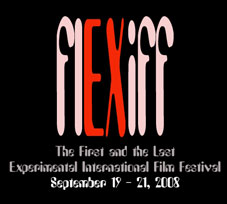 flEXiff is a unique event conceived in 2002 to collate works that are significant artistically, socially, culturally and politically without any restrictions in length, date of production and/or genres until 2022. Twenty years of presenting and archiving the world heritage through moving images is the main goal of flEXiff organizers. In the times of socio-economical and political crises dominating the world today, the works screened reflected various aspects of tolerance, resistance and representation in specific social and cultural contexts.
flEXiff is a unique event conceived in 2002 to collate works that are significant artistically, socially, culturally and politically without any restrictions in length, date of production and/or genres until 2022. Twenty years of presenting and archiving the world heritage through moving images is the main goal of flEXiff organizers. In the times of socio-economical and political crises dominating the world today, the works screened reflected various aspects of tolerance, resistance and representation in specific social and cultural contexts.
In best short film award category, the festival showcased 25 works from Australia, Belgium, Canada, France, Germany, Italy, UK, USA, Spain and Iran. The finalists in this year’s edition shared a common interest in defining new strategies in seeking resolutions for human conflicts internally and externally.
A Sunday in Pripyat by Blandine Huk and Frederic Cousseau from France was a testimony to environmental and human destruction caused by fellow humans describing the aftermath of Chernobyl nuclear power station disaster. The haunting images of deserted city of Pripyat that once inhabited 50,000 residents create a void in the audience’s perception of reality. It also reevaluates human desire to progress with such devastating outcome in regard to technological and specifically nuclear developments.
Flowers of Rwanda by David Munoz from Spain revisited Rwanda after nearly 800,000 people died in a genocide that tore the country and the world apart almost 10 years later. The ever-present collective memory of the massacre in everyday lives of people in Rwanda is the discourse that the film presents demanding the audience to affiliate. Intentionally, the film does not use archival images of the genocide rather confronts the aftermath and how people are dealing with the situation today.
The Lost Generation by Hussein Jehani from Australia, Kurdistan and Iraq excavates the past in a remote Kurdish village located between Iran and Iraq border almost 20 years after the war. The village elders speak of the times when the village was invaded by Iranian troops and a few days later by Iraqi soldiers. Each time, they captured the village; the soldiers placed mines to stop the enemy advancing. After the war, the mines were not destroyed or diffused as the local village members often accidently detonated the mines losing parts of their bodies. The on-going effect of war in this village is a metaphor for more devastating resolutions to human conflicts.
On the other hand, social and psychological conflicts were other important elements in the films screened this year. The realization of self identity in relation to definition of gender, race and class were also the themes carrying the narratives in the short film category. Antefatto by Francesca Staasch from Italy, Feasibility Studies: Indulging Anxiety by Ryan Fedyk from USA, Hezurbeitzak, A Common Grave by Izibene Onederra from Spain, and Reject by Millad Sabetkar from Iran were among the best of this section. ...
SUBSCRIBE

